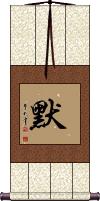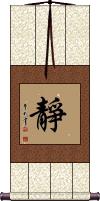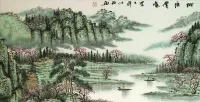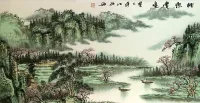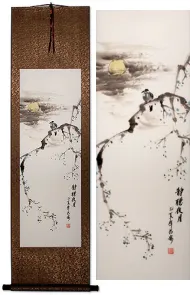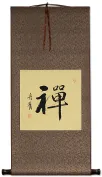Many custom options...
And formats...

Silence in Chinese / Japanese...
Buy a Silence calligraphy wall scroll here!
Personalize your custom “Silence” project by clicking the button next to your favorite “Silence” title below...
Silence
默 / 黙 means silent or silence and is often used in a Buddhist context.
Other meanings include dark, secret, or profound.
The original form is 默, but you will sometimes see it written in the 黙 Japanese variant form. If you want it in the Japanese form, please choose a Japanese calligrapher and use this to start your order instead of the button above: 黙
Code Of Silence
Inner Peace / Silence / Serenity
靜 is the simplest way to convey the meaning of inner peace and serenity.
靜 is often translated as “serenity.” It can also be used to express the ideas of still, calm, serene, quiet, silent, stillness, not moving, or tranquility.
In the old days, Chinese, Japanese, or Korean people might hang a wall scroll with this character in their reading room to bring about a sense of peace in the room.
![]() While they once used the same character form in Japan, they now use a slightly-simplified version in modern Japan (after WWII). This version is shown to the right, and can be selected for your wall scroll by clicking on that Kanji instead of the button above.
While they once used the same character form in Japan, they now use a slightly-simplified version in modern Japan (after WWII). This version is shown to the right, and can be selected for your wall scroll by clicking on that Kanji instead of the button above.
See Also: Peace
This in-stock artwork might be what you are looking for, and ships right away...
Gallery Price: $400.00
Your Price: $138.88
Gallery Price: $400.00
Your Price: $138.88
Gallery Price: $90.00
Your Price: $49.88
Gallery Price: $72.00
Your Price: $39.77
Not the results for silence that you were looking for?
Below are some entries from our dictionary that may match your silence search...
| Characters If shown, 2nd row is Simp. Chinese |
Pronunciation Romanization |
Simple Dictionary Definition |
金 see styles |
jīn jin1 chin kin きん |
More info & calligraphy: Gold / Metal(1) gold (metal); (2) (See 金色) gold (color); (3) gold (medal); first place (prize); (noun - becomes adjective with の) (4) something of great value; something golden (e.g. silence); (5) money; gold coin; (6) (written before an amount of money) sum (of money); (7) (abbreviation) (See 金曜) Friday; (n,ctr) (8) karat (measure of purity of gold); carat; (9) (See 五行・1) metal (fourth phase of Wu Xing); (10) (hist) Jin dynasty (of China; 1115-1234); Chin dynasty; Jurchen dynasty; (11) (abbreviation) {shogi} (See 金将) gold general; (12) (abbreviation) (colloquialism) (See 金玉) testicles; (surname) Kimu; Kim hiraṇya, 伊爛拏 which means cold, any precious metal, semen, etc.; or 蘇伐刺 suvarṇa, which means "of a good or beautiful colour", "golden", "yellow", "gold", "a gold coin", etc. The Chinese means metal, gold, money. |
叱 see styles |
chì chi4 ch`ih chih shikari しっ |
to scold; shout at; to hoot at (ateji / phonetic) (interjection) (1) (kana only) shh! (used to silence someone); sh!; (2) (kana only) shoo! (used to drive off an approaching animal, etc.); scolding |
黙 see styles |
mò mo4 mo moku もく |
Japanese variant of 默 (noun or adjectival noun) silence; stillness; quietness; (given name) Moku |
しぃ see styles |
shii / shi しい |
(interjection) (1) (See しっ・1) shh! (used to silence someone); sh!; (interjection) (2) (See しっ・2) shoo! (used to drive off an approaching animal, etc.); (suf,adj-i) (3) (after a noun, the -nai stem of a verb, or repetitive syllables) -ish; -like; -looking; (female given name) Shii |
不言 see styles |
bù yán bu4 yan2 pu yen fugen ふげん |
silence; (given name) Fugen does not say |
不語 不语 see styles |
bù yǔ bu4 yu3 pu yü fugo ふご |
(literary) not to speak silence |
六行 see styles |
liù xíng liu4 xing2 liu hsing rokugyō |
Among Buddhists the term means the practice of the 六度 six pāramitās; it is referred, among outsiders, to the six austerities of the six kinds of heretics: (1) 自餓 starvation; (2) 投淵 naked cave-dwelling (or, throwing oneself down precipices); (3) 赴火 self-immolation, or self-torturing by fire; (4) 自坐 sitting naked in public; (5) 寂默 dwelling in silence among graves; (6) 牛狗 living as animals. |
冷場 冷场 see styles |
lěng chǎng leng3 chang3 leng ch`ang leng chang |
stage wait; (fig.) awkward silence |
叱叱 see styles |
shisshi しっしっ |
(ateji / phonetic) (interjection) (1) (kana only) shh! (used to silence someone); sh!; (2) (kana only) shoo! (used to drive off animals, etc.) |
啞法 哑法 see styles |
yǎ fǎ ya3 fa3 ya fa ahō |
The doctrine of a deaf and dumb person, which he cannot proclaim. |
四記 四记 see styles |
sì jì si4 ji4 ssu chi shiki |
(or 四答) The Buddha's for methods of dealing with questions: direct answer, discriminating answer, questioning in return, and silence. |
宴默 see styles |
yàn mò yan4 mo4 yen mo enmoku |
Peaceful and silent. |
寂然 see styles |
jì rán ji4 ran2 chi jan jakunen じゃくねん |
silent; quiet (n,adj-t,adv-to) (1) lonely; desolate; (n,adj-t,adv-to) (2) (じゃくねん only) forlornness; desolation; (given name) Jakunen In calmness, quietude, silence; undisturbed. |
寂默 see styles |
jí mò ji2 mo4 chi mo jakumoku |
silence |
屏息 see styles |
bǐng xī bing3 xi1 ping hsi heisoku / hesoku へいそく |
hold one's breath (noun/participle) bated breath; being cowed into silence |
打靜 打静 see styles |
dǎ jìng da3 jing4 ta ching tajō |
To beat the silencer, or beat for silence. |
搭訕 搭讪 see styles |
dā shàn da1 shan4 ta shan |
to hit on someone; to strike up a conversation; to start talking to end an awkward silence or embarrassing situation |
梵壇 梵坛 see styles |
fàn tán fan4 tan2 fan t`an fan tan bondan |
or 梵怛 brahmadaṇda, brahma-staff 梵杖, the brahma (i.e. religious) punishment (stick), but the derivation is uncertain; the explanation is "to send to Coventry" a recalcitrant monk, the forbidding of any conversation with him, called also 默擯 exclusion to silence. |
森閑 see styles |
shinkan しんかん |
(noun or adjectival noun) silence; stillness; quietness |
沈黙 see styles |
chinmoku ちんもく |
(n,vs,vi) (1) silence; being silent; quiet; hush; (n,vs,vi) (2) reticence; inaction; (wk) Silence (1966 novel by Shūsaku Endō) |
沉寂 see styles |
chén jì chen2 ji4 ch`en chi chen chi |
silence; stillness |
消音 see styles |
xiāo yīn xiao1 yin1 hsiao yin shouon / shoon しょうおん |
to silence (n,vs,vt,vi) silencing (a machine, gun, etc.); muffling; muting (e.g. a TV) |
深閑 see styles |
shinkan しんかん |
(noun or adjectival noun) silence; stillness; quietness |
淵默 渊默 see styles |
yuān mò yuan1 mo4 yüan mo |
profound silence |
滅口 灭口 see styles |
miè kǒu mie4 kou3 mieh k`ou mieh kou |
to kill sb to prevent them from divulging a secret; to silence sb |
無言 无言 see styles |
wú yán wu2 yan2 wu yen mugon むごん |
to remain silent; to have nothing to say (noun - becomes adjective with の) silence (not speaking); muteness Without words, silent, speechless. |
無音 see styles |
yobarazu よばらず |
(noun - becomes adjective with の) silence; (place-name) Yobarazu |
疎音 see styles |
soin そいん |
prolonged silence |
白槌 see styles |
bái chuí bai2 chui2 pai ch`ui pai chui byakutsui |
自椎 The informing baton or hammer, calling attention to a plaint, or for silence to give information. |
破る see styles |
yaburu やぶる |
(transitive verb) (1) to tear; to rip; to break; to destroy; (transitive verb) (2) to break through (cordon, opponent's defense, etc.); to breach; (transitive verb) (3) to defeat; to beat; (transitive verb) (4) to break (e.g. silence); to disturb (e.g. peace); to shatter (e.g. dream); to disrupt; to spoil; (transitive verb) (5) to violate (e.g. rule); to break (e.g. promise); to infringe; (transitive verb) (6) to break (a record) |
Click here for more silence results from our dictionary
The following table may be helpful for those studying Chinese or Japanese...
| Title | Characters | Romaji (Romanized Japanese) | Various forms of Romanized Chinese | |
| Silence | 默 / 黙 默 | moku | mò / mo4 / mo | |
| Code Of Silence | 沉默法則 沉默法则 | chén mò fǎ zé chen2 mo4 fa3 ze2 chen mo fa ze chenmofaze | ch`en mo fa tse chenmofatse chen mo fa tse |
|
| Inner Peace Silence Serenity | 靜 静 | shizu / sei | jìng / jing4 / jing | ching |
| In some entries above you will see that characters have different versions above and below a line. In these cases, the characters above the line are Traditional Chinese, while the ones below are Simplified Chinese. | ||||
Successful Chinese Character and Japanese Kanji calligraphy searches within the last few hours...
